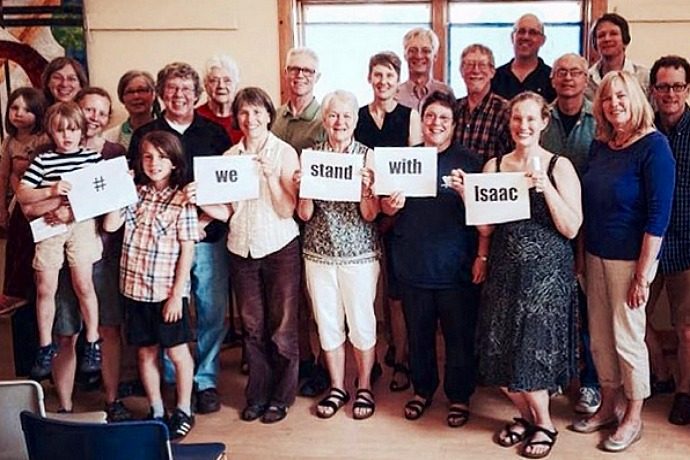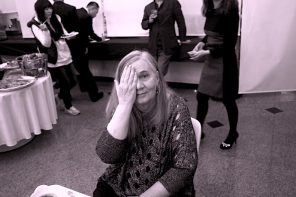Late last month, when my pastor Isaac Villegas was getting his ministerial credentials suspended for officiating a same-sex wedding, I suddenly remembered an email he sent me in 2014, when I—through stops and starts but mostly stops—was trying to decide if I wanted to be a Mennonite pastor.
Isaac and I were going through Peter Dula’s book on companionship, which Isaac remembered first reading when Peter was attending Chapel Hill Mennonite Fellowship.
“[Peter’s book] helped me realize that I wanted to become a pastor,” Isaac wrote to me, “because I couldn’t think of another job that would allow me to experience human life with the kind of mysterious intensity and ordinary beauty that Peter describes in his book.”
That’s who Isaac was when he was my pastor with the blessing of Virginia Mennonite Conference, that’s who Isaac still is without it—a pastor who believed, if he was to love the people in his life, he would need to betray the intimacies that led to getting his credentials in the first place. Isaac became Judas to some in order to break bread with others. Isaac’s public decision not only affirms queer life, it gives the church another chance to grow. Something has changed, something is new.
In the aftermath of his choice to officiate a same-sex wedding despite the opposition of VMC leadership, I’ve been hearing Isaac is a prophet. The word connotes a subversive Isaac on the periphery, witnessing to the center. But Isaac doesn’t simply live and work and love on the periphery. He lives and works and loves as if there is no use for a center at all. He refuses to forsake wildness. The word “prophetic” ends up being unhelpful because it attempts to describe an Isaac of this moment, an isolated Isaac suddenly emerging in discontinuity with the past.
This is much less a prophetic moment than a continuity, a long history of Isaac’s commitment to the experiment of church, to the practices of loving attention, to receiving his life as a gift from his friends—companions who continue to help him find words to trust. “Memory pulls us forward,” says Ruth in Marilynne Robinson’s Housekeeping, “so prophecy is only brilliant memory.”
When I think of his pastoral theology, I recall an image he’s often made use of in his preaching: I think of someone becoming all fire. Isaac ended a sermon in 2010 with a fourth-century story of two monks in the Egyptian desert—a crazy story about “someone who believes that God’s fire can be a reality in our lives, a tangible experience, that we too can be God’s fire made flesh.” In the desert, as the story goes, Abba Lot went to see Abba Joseph and said:
“Abba, as far as I can I say my little office, I fast a little, I pray and meditate, I live in peace…What else can I do?” Then the old man stood up and stretched his hands towards heaven. His fingers became like ten lamps of fire and he said to him, “If you will, you can become all fire.”
Reading his 2010 sermon again, a vivid memory comes to me—Isaac lifting a book from his desk, manically flipping through its pages, finding the passage and reading this story to me while he stands by his crowded bookshelf, smiling the whole time. As the memory plays in my mind, Isaac gets to the end—His fingers became like ten lamps of fire and he said to him, If you will, you can become all fire—then he closes the book, looks up at me, speechless, and erupts with astonished laughter.
When I think of Isaac’s pastoral life, I think of the monk’s story—Isaac as a fire whose origins lie in so many other fires, whose power is in the way his flames flicker and flare, making visible the people and their loves.
While the internet media blitz of support and love for Isaac continues, I’ve found myself returning to the CHMF website—a quieter image of our little congregation in all its complexity—where you’ll find Isaac preaching about fire and tears and blue birds, about life as “a fleeting education in how to love.” A wonderfully boring home page will welcome you there, and, among other things, you’ll find an archive of sermons over the years from the dozens of people who have participated in one of the more beautiful literary traditions I know—a preaching tradition based more on communal conversation than personality.
So when the powerful moment of #WeStandWithIsaac fades, the experiment of CHMF will remain a place for conversation to continue, a many-issued discussion among an ever-changing group of people searching for what constitutes good news—what fires to kindle in this life between the ashes of Lent. If the search is to be a hopeful one, those who’ve been silenced will find in the conversation a voice, breath to blow on the embers of our lives together—creating a place to glimpse the mysterious intensity and ordinary beauty of human life. That’s where you’ll find Isaac, encircled by his friends—small fires and flames, ministering to him.





